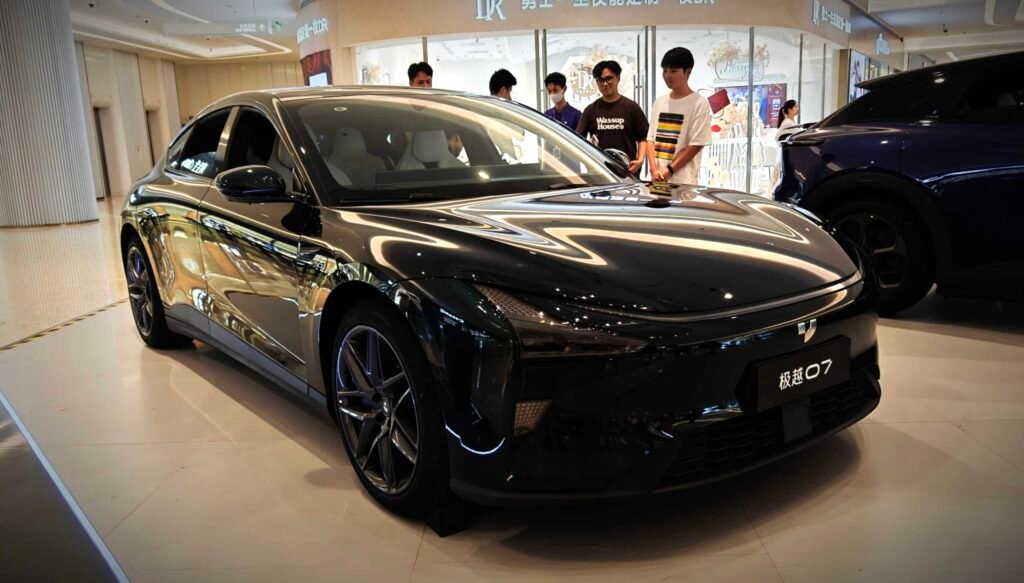Jiyue Auto, backed by Geely and Baidu, suddenly collapsed amid a financial crisis involving employee salary arrears, department closures and supply chain problems. In November, the Jiyue 01 and Jiyue 07 recorded sales of only 902 and 1,030 units respectively, with cumulative sales since launch only around 14,000 units.
– Advertisement –

One of the biggest disappointments of Jiyue’s demise is that the Robo X hypercar, which debuted at the Guangzhou Auto Show, will never see the light of day. The Robo

Concerns have arisen as livestream platforms in China advertise Jiyue 07 at heavily discounted prices ranging from 19,800 to 29,800 yuan (2,710 to 4,080 USD), raising questions about their legitimacy. Although Jiyue officials deny involvement and clarify that sales have been halted, conflicting reports about the company’s status have raised alarms among potential buyers.
– Advertisement –

We have previously tested the Jiyue 07 (see specifications). Was this car a factor in Jiyue’s downfall?
Exterior
The Jiyue 07 is designed with a minimalist aesthetic that reflects the brand’s futuristic vision. With a length of 4953 mm, a width of 1989 mm and a wheelbase of 3013 mm, it firmly establishes itself in the C-segment. The design philosophy focuses on simplicity, with streamlined surfaces and integrated lighting elements.
– Advertisement –

The front of the vehicle features a sleek, flat headlight design with an interactive lighting system, giving the car a modern and high-tech look. The side profile is defined by elegant Venus-inspired curves and hidden B-pillars, which emphasize the smooth silhouette. An optional rear spoiler gives the car a sporty touch, while the drag coefficient of just 0.198 emphasizes the focus on aerodynamics and efficiency.

Interior
The Jiyue 07 delivers a high-tech, premium feel. The interior is dominated by a huge 36.5-inch screen that merges infotainment and driver data, similar to that of the Geely Galaxy E8 (see specs). The screen is powered by Baidu’s Apollo autonomous driving platform and the Snapdragon 8295P chipset, ensuring smooth and reliable performance. The car also features an intelligent voice assistant that enables intuitive interaction, with a ‘what you see is what you say’ feature that enables effortless operation.

The interior materials combine high-quality metals and ambient lighting, creating a premium atmosphere. In particular, the absence of conventional gear levers reflects the modernity of the Jiyue 07, opting instead for a touchscreen interface that controls gear selection. While some drivers may find this feature unconventional, it is in keeping with the car’s groundbreaking, minimalist design. The seats are ergonomically designed to provide solid support, and the vehicle’s long wheelbase translates into generous legroom, increasing passenger comfort. Innovative features, such as door knobs instead of traditional handles and automatic door closures when braking, contribute to the futuristic and user-friendly experience.


Behind the wheel
During our test drive, the Jiyue 07 demonstrated responsive handling on winding mountain roads, providing a dynamic and comfortable driving experience. The car’s suspension effectively absorbed bumps on uneven city streets, giving passengers a smooth ride.

Continental tires contribute to the vehicle’s confident handling and provide good grip and stability. The regenerative braking system enhanced the driving experience by efficiently recovering energy and providing a smooth, responsive braking feel. Drivers can adjust braking intensity to their preferences, offering a more personalized experience. Under mixed driving conditions, the car’s energy consumption averaged 18 kWh per 100 kilometers, which corresponds to the theoretical maximum range of 600 km.

Thanks to the dual motor configuration, the Jiyue 07 delivers impressive performance. With a claimed 0-100 km/h acceleration time of just 3.5 seconds, it is an attractive option for consumers looking for high-performance electric vehicles within the C-segment. The car’s handling benefits from the finely tuned chassis, based on Geely’s SEA platform, which combines agility and comfort.

Pronunciation
The Jiyue 07 entered a competitive market dominated by established players and newcomers like Xiaomi. Although its innovative design, advanced technology and powerful features make it attractive, it failed to stand out in the Chinese market. Jiyue’s struggles with brand recognition, financial instability and operational challenges have created significant hurdles. Even the company name “Jiyue” is easily confused with “Zeekr” in Chinese. Both company names have two Chinese characters, starting with “极” which means extreme. Not to mention, Geely is backing both Jiyue and Zeekr.

Although backed by Geely and Baidu, Jiyue’s financial woes have overshadowed its ambitions in the EV sector. Allegations of unpaid wages, department dissolutions, unsold vehicles (Jiyue 01 and 07) and attempts to sell cars at unusually low prices through unauthorized channels have damaged the company’s credibility. In the same price segment, car buyers can opt for the popular Xiaomi SU7, Zeekr 007, Lynk & Co Z10 or even the cheaper Mazda EZ-6 with similar dimensions.

Stay tuned for next week Sunday China Drive bee Car news Chinawhere you can read more personal reviews of Chinese cars.

